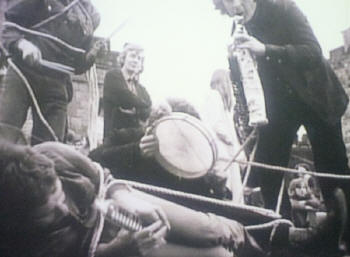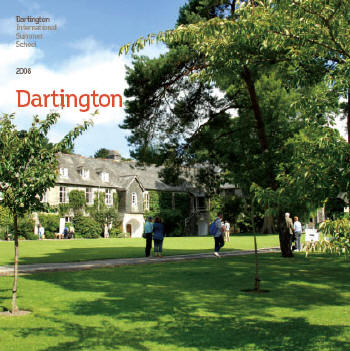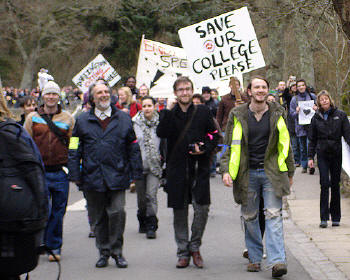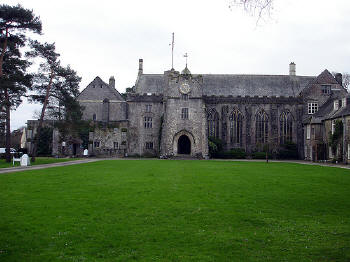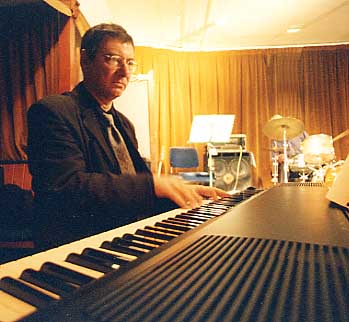|
|
| home | features | exhibitions | interviews | profiles | webprojects | gazetteer | links | archive | forum |
|
Sam Richards on experimental music and the campaign to save Dartington College Sam Richards is musician who has performed all over Britain as well as internationally. He is also the author of books on folksong, musical democracy and John Cage. A prominent member of the Save Our Dartington campaign, he is an Associate Lecturer at the University of Plymouth.
Interview by Kate Jago KJ It's great to meet a fellow enthusiast for the work of Cornelius Cardew. When did you first meet him?
Preparing for a performance of John Cage's "Water Music", I needed a duck whistle - not really knowing that this was the kind of duck call that you could get from huntin'-shooting'-fishin' shops. One of my A-Level tutors had been at the Royal Academy of Music with Cardew and arranged for me to borrow Cardew's duck whistle. I called round to pick it up, and Cornelius and I had a chat about performing Cage. Obviously, I returned the duck whistle when I'd finished with it!
Some of my peers
studied with Cardew at the Royal Academy - Hugh Schrapnel, Christopher
Hobbs - and I remember being invited to play one of Hugh's compositions
for a composition lesson at the Academy. After that I was in ensembles
that played Cardew's "The Tiger's Mind" and "Schooltime Compositions".
Funnily enough, given its influence on my own work, I was never in the
Scratch Orchestra (picture below left). I'd moved to Devon by
then.
SR Yes.
Nearly forty years actually. I'd had a frustrating year at the Guildhall
School of Music and Drama. I'd gone there to study with Alfred Nieman,
but it turned out he was only good thing there. The rest was so old
school you could smell the mould. The summer before I started at the
Guildhall Nieman (who I knew from
KJ To what extent would you say that Dartington's reputation was linked to the innovation and standard of the Summer School? Obviously the association with leading composers and performers of the day was of great benefit to students, but I wonder how it contributed in terms of standard of performance and ambition to the wider College?
SR My
experience was always that the Summer School and the College were
different institutions with a little overlap, but really not much. The
leading composers and performers you mention, for example, did not also
teach at the college. On the other hand menial work was offered to
College students in return for which they got into some events and
soaked up the atmosphere.
But in answer to
your first question, Dartington College of Arts made its own reputation.
Don't forget that the Summer School, in any case, is just music. The
College had visual art, theatre, dance and writing as well.
KJ You're right of course about the broader scope of the College. From the outside it's difficult to separate the ethos of each of the components of the Dartington campus, as well as the intrinsic links to Totnes. But the merger with University College Falmouth will effect this. You've articulated something of the energy that has gone into the attempt to save the College (reference: www.savedartingtoncollege.org) - how do you feel about the situation now? SR First let's be clear. The merger with Falmouth took place in April of this year, but courses will run at Dartington for the next couple of years but under the auspices of University College Falmouth. Officially, what is happening is a merger and relocation. However, the argument of the Save Dartington College campaign, and one that I totally agree with Ė as does everyone I talk to - is that Dartington College of Arts is inextricably linked with its present campus on the Dartington Estate. The unique environment has always been one of its strongest selling points, and its ethical link with the overall Dartington project is equally, if more intangibly, important. Furthermore, the college is part of the character, culture and economy of Totnes and the surrounding area. The word ďrelocationĒ, for these reasons, is one that I am reluctant to use. Everyone I know, and everyone the Save Dartington College campaign ever spoke to, sees what is happening as closure. Whatever you call it, however, the fact is that the College of Arts at Dartington is soon to disappear.
The independent assessment of the college done by Jim Port of JM Consulting only a few years ago concluded that staying on site was the best option for the College, although it acknowledged that this would involve difficulties. The second Port report changed this tune. It is a matter of concern as to why this was. However, I have to say that this whole affair has only served to point out uncomfortable structural truths about the Dartington enterprise as a whole - not just the college. It was an enterprise built on privilege - the privilege initially "bought" by the Elmhirsts, the founders of the estate in the 1920s. I'm sure there are always plenty of us who have brilliant ideas about how society should be run, or even just a small alternative enclave within society. Only millionaires like the Elmhirsts get the chance to try things out and use everybody around them as participants. Structurally, however, this is a dodgy situation because when the founders pass on, when the old school looses control, and when times change, and when all the most interesting enterprises are lost or sold off, all that's left is this feudal ownership based on land and wealth - which is now taking on a more corporate face day by day.
KJ So
even if the Save Dartington College campaign were successful, it would
represent a doomed enterprise? What those of us who care about Dartington College should be doing now is first to spread and continue what the college at its best really did. Second, not to be sentimental about it and admit that it got a lot wrong. And third, we must campaign fiercely for a public enquiry into all aspects of this sorry affair.
SR We need to get beyond the myths about Dartington College and consider its real strengths. For those who studied or taught there (and I did both) its culture of creative liberalism was by far the most important element. Yet it was also the most intangible and hard to describe. This is where history, tradition and culture are so important. To be in the very place where this culture was dominant, and had been so since the 1920s, was to absorb it by osmosis. Nobody needed to explain it, neither to students nor staff. And the key ingredient in this creative liberalism was its belief in - one might say faith in - the imagination. This is what I valued as a student as against the technocracy of a leading London music college. However, it must be admitted that it was also what made Dartington infuriating. The imagination, after all, is fuzzy, non-logical and works in flashes and hunches rather than straight lines. Of course, it was straight-line thinking that eventually infiltrated and led to the closure of the college. More specifically, there were some quite innovative experiments at Dartington. The theatre course at one time, for example, was a four-year degree course with the third year out making theatre - of any kind - in working class communities in Rotherhithe, London or Stonehouse, Plymouth. These were both rough areas and a real challenge, especially to the more middle class students. The College should always have done things like this, and had it survived the recent crisis should have revisited this idea - the perfect antidote to its marked tendency to preciousness. A real combination of creative liberalism in constant dialogue with life-as-it-is-lived would have been the dream ticket. Still, those of who know about and appreciate this cannot fail to take such insights with us wherever we go. KJ Despite difficulties of transition, will the broader focus of Dartington, with not only the music but also visual arts, theatre, dance and writing you mention, benefit from absorption within the future Arts University of Cornwall?
In my experience at the moment, certainly in the field of music, there is shift of energy towards Plymouth which is rapidly becoming a more exciting place. If I were a prospective student looking for a music course today I'd think seriously about the University of Plymouth. Peninsula Arts puts on really interesting music events all year round, including a contemporary music festival every February. There's excellent research into computer music. There's a B.A. course in Music which is about to move into a new building. And in and around the university and Plymouth generally there is no kind of music that isn't catered for - orchestras, rock, folk, jazz, chamber music, experimental and electronic music, you name it. On the basis that itís generally fruitful to go where things are happening I'm putting a lot of energy into Plymouth-based activities. I occasionally play improvised music for poets at the Arts Centre, my famous (or infamous) music for fish and string orchestra is being played at the National Marine Aquarium, Plymouth, on November 1st this year. I'm teaching on the B.A. course, I'm doing a piano concert for Peninsula Arts next year, and I'm creating a new piece based on Kropotkin's notion of Mutual Aid for the festival in February. Frankly, Dartington hasn't been able to offer that degree of interest for many years now. Given how long Plymouth was in the doldrums - from being bombed in the war well into the 1980s - I'm really glad that itís on the up.
This interview first appeared in Proof magazine and appears courtesy of the Editor. |
|
|

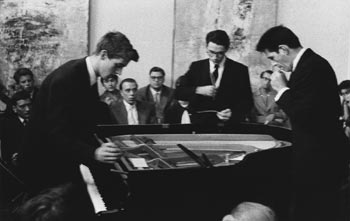 SR
I was a music student in London in the late '60s. Anyone who had
the least interest in experimental music knew of Cardew (pictured
performing with David Tudor and John Cage right).
SR
I was a music student in London in the late '60s. Anyone who had
the least interest in experimental music knew of Cardew (pictured
performing with David Tudor and John Cage right). 